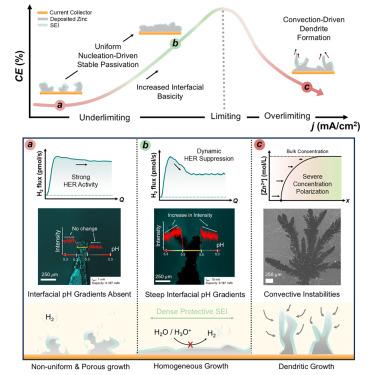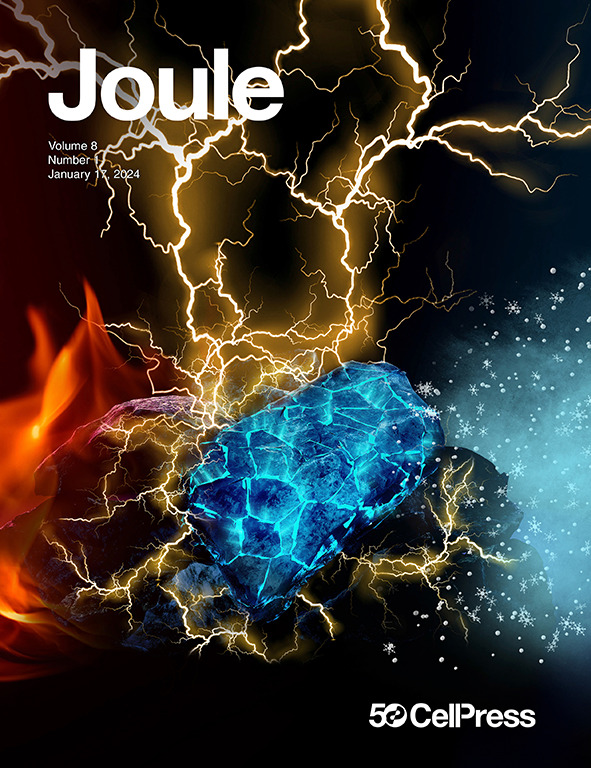界面pH梯度抑制锌金属电池在大电流下的HER
IF 35.4
1区 材料科学
Q1 CHEMISTRY, PHYSICAL
引用次数: 0
摘要
水锌金属电池(azmb)因其丰富、安全、低成本和高容量而成为Li/Na系统的有吸引力的替代品。不幸的是,循环效率受到阳极析氢反应(HER)的阻碍。矛盾的是,更高的电流密度通常会提高库仑效率(CE),这与传统的电化学预期相悖。在这里,我们通过揭示界面pH梯度在锌电沉积中的作用来解决这个矛盾。通过先进的测量,包括电化学质谱和荧光显微镜,我们发现在高电流和低容量下出现陡峭的pH梯度,促进均匀固体电解质界面(SEI)的快速形成,抑制氢的析出并增强CE。由于对流不稳定,这种优势在较大容量或极端电流下会减弱。我们提出了一个统一的框架,整合了pH梯度,SEI形成,HER抑制,锌成核和生长以及对流,我们提出了延长实际和实际容量循环寿命的充放电协议,推进了商业相关的azmb。本文章由计算机程序翻译,如有差异,请以英文原文为准。

Interfacial pH gradients suppress HER at high currents in zinc metal batteries
Aqueous zinc metal batteries (AZMBs) are attractive alternatives to Li/Na systems due to their abundance, safety, low cost, and high capacity. Unfortunately, cycling efficiency is hindered by hydrogen evolution reaction (HER) at the anode. Paradoxically, higher current densities often yield improved Coulombic efficiency (CE), defying classical electrochemical expectations. Here, we resolve this paradox by revealing the role of interfacial pH gradients in zinc electrodeposition. Through advanced measurements, including electrochemical mass spectrometry and fluorescence microscopy, we show that steep pH gradients emerge at high currents and low capacities, fostering rapid formation of a uniform solid electrolyte interphase (SEI) that suppresses hydrogen evolution and enhances CE. This advantage diminishes at larger capacities or extreme currents due to convective instabilities. We present a unified framework, integrating pH gradients, SEI formation, HER suppression, zinc nucleation and growth, and convection, and we propose charge-discharge protocols that extend cycle life at practical and real capacities, advancing commercially relevant AZMBs.
求助全文
通过发布文献求助,成功后即可免费获取论文全文。
去求助
来源期刊

Joule
Energy-General Energy
CiteScore
53.10
自引率
2.00%
发文量
198
期刊介绍:
Joule is a sister journal to Cell that focuses on research, analysis, and ideas related to sustainable energy. It aims to address the global challenge of the need for more sustainable energy solutions. Joule is a forward-looking journal that bridges disciplines and scales of energy research. It connects researchers and analysts working on scientific, technical, economic, policy, and social challenges related to sustainable energy. The journal covers a wide range of energy research, from fundamental laboratory studies on energy conversion and storage to global-level analysis. Joule aims to highlight and amplify the implications, challenges, and opportunities of novel energy research for different groups in the field.
 求助内容:
求助内容: 应助结果提醒方式:
应助结果提醒方式:


